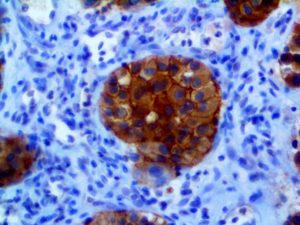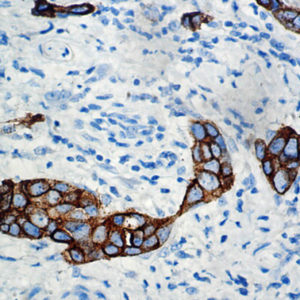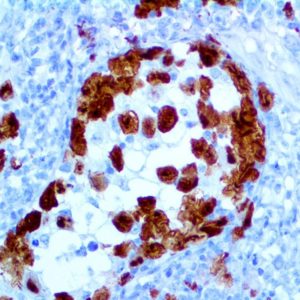
IHC of NRAS on an FFPE Melanoma Tissue
| Intended Use | For In Vitro Diagnostic Use. | |||||||||||||||||||||||||||||||||||
| Summary and Explanation | NRAS is an enzyme that in humans is encoded by the NRAS gene. The NRAS oncogene is a member of the Ras gene family. It is mapped on chromosome 1. The Ras genes have GTP/GDP binding and GTPase activity, and their normal function may be as G-like regulatory proteins involved in the normal control of cell growth. Mutations which change amino acid residues 12, 13 or 61 activate the potential of N-Ras to transform cultured cells and are implicated in a variety of human tumors. Tumor mutation profiling has identified the highest incidence of NRAS mutations in melanoma (~30%), acute myeloid leukemia (~15%) and thyroid carcinoma (5-10%). The Q61R is the most common NRAS mutation found in melanoma that is thought to occur due to UV and radiation exposure. The Q61R mutation results in an amino acid substitution at position 61 in NRAS, from a glutamine (Q) to an arginine (R). It is a commonly acquired mutation found in primary melanomas from melanoma-prone families that have known germline CDKN2A mutations, and it is associated with loss of the wild-type NRAS allele. It is also detected in patients with congenital melanocytic nevi (CMN), which can develop into malignant melanoma. The NRAS Q61R is the most common oncogenic event in encapsulated thyroid tumors of follicular cell origin with high-grade features. 20% of adrenocortical tumors solely carry this RAS alteration; however, adrenocortical hyperplasia does not, suggesting NRAS Q61R is an oncogenic event driving adrenocortical tumor development. | |||||||||||||||||||||||||||||||||||
| Antibody Type | Rabbitt Monoclonal | Clone | RBT-NRAS | |||||||||||||||||||||||||||||||||
| Isotype | IgG | Reactivity | Paraffin, Frozen | |||||||||||||||||||||||||||||||||
| Localization | Membranous | Control | Melanoma, Follicular Thyroid Carcinoma with NRAS Q61R mutations | |||||||||||||||||||||||||||||||||
| Presentation | NRAS is a rabbit monoclonal antibody derived from cell culture supernatant that is concentrated, dialyzed, filter sterilized and diluted in buffer pH 7.5, containing BSA and sodium azide as a preservative. | |||||||||||||||||||||||||||||||||||
| Availability |
| |||||||||||||||||||||||||||||||||||
| Note: For concentrated antibodies, please centrifuge prior to use to ensure recovery of all product. | ||||||||||||||||||||||||||||||||||||




